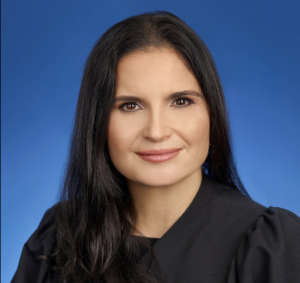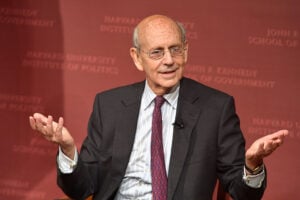Over
the
course
of
the
past
decade
or
so,
litigation
finance
has
undergone
a
transformation
of
sorts,
starting
off
in
the
industry
as
a
little-known,
novel
legal
concept
before
becoming
a
widely
accepted
and
often
heralded
part
of
the
profession
that’s
helped
to
level
the
playing
field
in
the
civil
justice
system.
Litigation
funding
is
now
so
mainstream
that
it’s
ranked
by
Chambers
and
Partners.
This
made
us
wonder:
What
has
it
been
like
to
navigate
the
world
of
litigation
funding
as
it’s
expanded
to
a
flourishing,
billion-dollar
industry?
We
recently
had
the
pleasure
of
speaking
to
Lee
Drucker
and
Boaz
Weinstein,
the
founders
of
Lake
Whillans
Capital
Partners
(Lake
Whillans
and
Boaz
are
ranked
by
Chambers),
about
their
journey
in
the
litigation
finance
field.
Here
is
a
(lightly
edited
and
condensed)
write-up
of
our
lively
conversation
about
third-party
litigation
funding
and
what
it’s
been
like
to
start
and
build
a
career
from
the
ground
up
in
this
constantly
developing
industry.
Staci
Zaretsky
(SZ):
Describe
the
path
that
you
took
from
law
school
to
litigation
finance.
What
led
you
here?
Lee
Drucker
(LD):
My
path
to
litigation
finance
was
basically
a
direct
shot.
I
was
a
JD/MBA
student
at
NYU.
In
my
first
summer,
I
took
a
position
with
a
retired
partner
from
Latham
&
Watkins.
He
hired
me
that
summer
to
help
put
together
business
plans
and
look
at
assorted
opportunities
at
the
intersection
of
law
and
business
for
a
company
called
Burford
Advisors.
The
opportunity
I
worked
on
most
extensively
involved
litigation
finance.
I
helped
him
do
research
and
put
together
a
business
plan
around
it.
This
was
the
summer
of
2008.
My
second
summer,
I
interned
at
a
law
firm,
my
third
summer,
I
interned
at
an
investment
bank.
Upon
graduation
in
2011,
I
was
still
very
keen
to
move
back
into
litigation
finance.
The
partner
I
had
worked
for
had
significantly
advanced
the
ball
in
the
field;
litigation
finance
had
grown
a
bit,
but
it
still
wasn’t
very
large
or
built
out.
A
slightly
different
iteration
of
the
company
I
had
worked
for
went
public
about
a
year
and
a
half
later.
That
company,
Burford,
is
now
the
largest
litigation
funder
in
the
world.
The
Latham
partner
that
I
worked
for
left
Burford
and
started
his
own
shop,
and
he
helped
me
get
my
footing
in
litigation
finance
right
out
of
the
gate
when
I
graduated.
Boaz
Weinstein
(BW):
So,
unlike
Lee,
I
had
a
longer
path
as
a
lawyer
before
moving
into
litigation
finance.
I
graduated
from
Harvard
University
and
Columbia
Law
School.
I
did
two
clerkships
following
law
school.
First
for
the
Chief
Justice
of
the
New
Mexico
Supreme
Court,
and
then
later
for
a
federal
district
court
judge
in
the
Southern
District
of
New
York.
I
started
my
career
in
a
traditional
way,
working
for
Cleary
Gottlieb
as
a
litigator,
and
spent
six
years
there
before
deciding
I
wanted
something
more
entrepreneurial.
That
led
me
to
move
over
to
the
plaintiff-side
firm
Bernstein
Litowitz,
which
is
the
premier
plaintiff-side
securities
litigation
firm,
where
I
represented
investors
in
large
class
actions.
I
was
there
for
three
years
before
I
ever
heard
of
litigation
finance,
which
was
still
very
nascent.
In
2011,
I
found
my
way
into
the
field
when
one
of
the
partners
at
Bernstein
Litowitz,
who
I
had
worked
with
closely
and
who
had
recruited
me
into
the
firm,
decided
to
open
a
litigation
finance
firm,
one
of
the
first
firms
to
plant
its
flag
in
the
U.S.
I
thought
it
was
a
unique
opportunity
to
get
in
on
the
ground
floor
of
an
industry
that
served
an
important
need.
The
legal
industry
is
likely
the
only
industry
in
America
where
capital
can’t
flow
in
as
equity
in
the
normal
course
because
nonlawyers
can’t
own
pieces
of
law
firms
and
so
firms
can’t
raise
equity
in
the
normal
way.
I
decided
that
I
would
give
it
a
go.
And
that’s
where
Lee
and
I
met
—
we
both
worked
at
this
firm
for
a
year
and
a
half
before
we
decided
to
strike
out
on
our
own
and
start
Lake
Whillans
in
2013.
SZ:
Let’s
talk
about
the
progress
that
this
industry
has
made
in
recent
years.
Tell
me
about
what
it
was
like
when
litigation
finance
really
started
to
catch
on,
and
what’s
happening
now.
BW:
When
we
first
started
in
the
business,
around
2011
to
2013,
litigation
finance
was
not
well
known
in
legal
circles.
A
lot
of
the
questions
we
got
when
we
were
trying
to
educate
people
on
the
space
were
along
the
lines
of,
“Can
you
do
that?
Is
that
legal?”
It
took
a
number
of
years
for
the
market
to
accept
the
practice
and
to
go
from
“Can
you
do
that?”
to
“How
do
we
do
this?”
From
about
2015
to
2018,
we
had
a
major
shift
in
the
market
where
it
felt
like
litigation
finance
had
really
become
embraced
by
the
largest
law
firms
in
the
land.
In
its
initial
phases,
litigation
finance
was
mostly
utilized
by
small
to
medium-sized
companies,
which
needed
funding,
and
often,
smaller
firms
that
represented
those
companies.
It
took
some
time
for
the
largest
firms
to
agree
to
use
litigation
finance
and
become
well
versed
in
it.
And
now
we’re
at
a
point
where
it
really
is
common
for
large
law
firms
and
lawyers
across
the
U.S
to
be
utilizing
litigation
finance
in
one
form
or
another.
The
frontier
of
the
industry
—
and
I
don’t
call
it
the
frontier
to
imply
it’s
necessarily
wild,
rather
it’s
the
place
where
most
of
the
action
is
happening
right
now
—
is
at
the
larger
corporate
level.
I
would
say
we
are
in
the
midst
of
an
adoption
similar
to
the
adoption
by
large
law
firms,
where
large
corporations
are
increasingly
becoming
users
of
litigation
finance,
not
necessarily
because
they
don’t
have
the
funds
to
bring
a
claim,
but
because
it’s
a
helpful
tool.
Every
year,
we
do
more
deals
with
more
large-name
corporations,
and
you
can
see
that
it
is
becoming
increasingly
accepted.
I
would
not
yet
say
it
at
the
same
place
where
the
law
firm
market
is,
but
it’s
following
a
similar
trajectory.
SZ:
What
steps
are
you
taking
to
help
grow
the
market
even
more?
BW:
We
have
always
sought
to
promote
education
in
the
space.
Early
on,
we
decided
—
really
in
conjunction
with
Above
the
Law
—
to
take
an
active
role
in
writing
thought
leadership
pieces
about
the
industry
to
educate
the
market
about
litigation
finance.
Even
when
people
felt
like
litigation
finance
wasn’t
a
dirty
word
anymore,
there
were
still
all
sorts
of
practical
questions
that
lawyers
wanted
to
understand
before
they
would
feel
comfortable
enough
to
recommend
it
to
their
clients.
To
that
end,
we
partnered
with
Above
the
Law
to
write
pieces
about
the
essential
aspects
of
litigation
finance.
We
covered
issues
like:
What
can
you
expect
in
terms
of
process
when
you
call
a
litigation
funder?
How
do
you
protect
privilege
when
you’re
dealing
with
a
litigation
funder?
What
are
the
ethical
issues
for
attorneys
to
consider
when
dealing
with
litigation
finance?
What
are
the
deal
structures
that
litigation
finance
might
have?
What
about
champerty?
Are
there
any
regulatory
issues?
These
are
the
nuts
and
bolts
of
how
the
industry
works
and
we
really
were
trying
to
demystify
the
industry
in
a
very
approachable
way
so
that
lawyers
would
feel
comfortable
with
introducing
their
clients
to
the
product.
We
were
setting
the
tone
for
the
kind
of
open
approach
and
professionalism
with
which
we
approach
the
industry.
It’s
given
people
an
opportunity
to
feel
comfortable
in
asking
questions
and
starting
dialogues.
It’s
led
to
several
relationships
that
have
continued
to
grow
and
bloom
over
the
course
of
a
number
of
years.
SZ:
Is
there
anything
else
you’ve
been
doing
to
educate
lawyers
about
the
benefits
of
litigation
finance?
BW:
Absolutely.
We
give
CLE
presentations
on
litigation
finance
and
the
ethics
of
litigation
at
law
firms.
We’ve
spoken
at
conferences
in
the
United
States
and
abroad.
The
other
thing
that
we’re
known
for
in
the
industry
is
flexibility
and
sensibility
about
how
to
get
deals
done.
What
we
ultimately
do
is
offer
a
financial
product.
And
for
that
financial
product
to
be
useful,
it’s
got
to
really
be
geared
toward
the
needs
and
wants
of
whatever
company
we
happen
to
deal
with.
And
so,
we
don’t
approach
situations
formulaically.
We
come
at
them
with
an
eye
toward
finding
a
way
that
we
can
make
a
deal
work,
even
if
it’s
unconventional.
SZ:
I
recently
saw
an
article
in
Wired
about
the
actual
Lake
Whillans,
which
is
a
subglacial
lake
of
profound
scientific
importance.
When
it
came
time
to
name
the
business,
why
did
you
decide
to
name
it
after
Lake
Whillans?
What’s
the
connection
between
litigation
finance
and
this
subglacial
lake?
LD:
Boaz
and
I
think
of
ourselves
to
be
investors
first
and
foremost.
And
as
investors,
we
are
looking
for
inefficient
markets
to
allocate
capital.
In
2013,
when
we
started
this
company,
litigation
finance
was
undiscovered,
untapped,
and
unused
in
litigation
in
the
United
States,
as
Boaz
laid
out
earlier.
It
was
this
really
interesting,
inefficient
asset
class
that
people
hadn’t
yet
thought
about
or
discovered,
and
it
was
something
we
looked
at
and
thought
could
be
really
large
—
maybe
not
the
size
of
the
U.S.
equity
markets
or
the
U.S.
bond
markets
—
but
it
could
be
a
sizable
asset
class
that
people
just
weren’t
paying
attention
to
or
didn’t
know
existed.
At
the
time
we
were
launching
the
business,
there
was
an
expedition
in
Antarctica
that
had
just
proved
successful
in
excavating
a
subglacial
lake.
It
was
the
first
expedition
to
ever
do
so,
and
that
subglacial
lake
was
Lake
Whillans.
Not
only
were
they
able
to
successfully
excavate
the
lake,
but
what
they
found
there,
which
they
were
not
expecting
because
of
the
lack
of
sunlight
and
oxygen,
was
a
thriving
ecosystem
with
untapped
potential
that
scientists
continue
to
explore.
We
thought
that
was
a
perfect
metaphor
for
what
we
were
looking
to
do,
which
was
to
excavate
and
explore
previously
uncharted
territories
in
the
hopes
of
finding
new
financial
ecosystems
So
that’s
why
we
named
our
company
after
the
lake
and
the
expedition.
SZ:
On
a
more
personal
note,
what
is
your
greatest
satisfaction
about
working
in
litigation
finance?
LD:
For
me,
it’s
related
back
to
the
Lake
Whillans
definition
—
even
though
it’s
becoming
more
developed,
there’s
no
playbook
for
how
to
proceed
or
how
to
build
this
business
or
how
to
contribute
to
the
legal
ecosystem.
I
find
it
exciting
to
be
constantly
navigating
that
world
and
being
part
of
how
we
expand
it
and
looking
at
innovative
ideas
and
finding
things
out.
Some
things
fail,
some
things
succeed;
you
build
on
those
successes.
Without
a
playbook,
this
is
truly
about
having
a
vision
of
what
is
possible
and
setting
out
to
create
it.
It’s
a
different
type
of
task,
but
that’s
what
I
like
about
it.
BW:
Litigation
finance
allows
me
to
pair
the
best
of
what
I
liked
about
being
a
lawyer
–
understanding
the
strengths
and
weaknesses
of
claims,
evaluating
how
claims
will
play
out
–
with
the
dynamism
of
business.
We
are
constantly
working
with
sophisticated
claimholders
and
lawyers
on
new
opportunities,
working
to
craft
solutions
that
provide
win-win
outcomes
for
all.
***
Since
2017,
Lake
Whillans
and
Above
the
Law
have
collaborated
on
an
annual
research
report
for
which
we
ask
in-house
counsel
and
law
firm
attorneys
to
share
their
perspectives
on
third-party
litigation
funding.
Year
over
year,
our
survey
findings
have
tracked
the
explosive
growth
of
this
field.
Our
findings
show
that
an
increasing
number
of
law
firms
and
their
clients
view
litigation
funding
as
a
valuable
resource.
To
cite
merely
one
example,
an
overwhelming
majority
(88%)
of
our
respondents
with
prior
experience
with
litigation
finance
would
recommend
the
practice
to
others,
and
nearly
all
(94%)
told
us
they
would
turn
to
litigation
funding
again
themselves.
On
behalf
of
everyone
here
at
Above
the
Law,
we’d
like
to
congratulate
Lake
Whillans
on
its
progress
in
educating
members
of
the
legal
profession
on
the
use
of
litigation
finance
and
its
success
as
one
of
the
top-tier
litigation
funders
in
the
industry.
(Disclosure:
Lake
Whillans
is
an
Above
the
Law
advertiser.)
 Staci
Staci
Zaretsky is
a
senior
editor
at
Above
the
Law,
where
she’s
worked
since
2011.
She’d
love
to
hear
from
you,
so
please
feel
free
to
email
her
with
any
tips,
questions,
comments,
or
critiques.
You
can
follow
her
on
Twitter
or
connect
with
her
on
LinkedIn.
 Joe
Joe










 Kathryn
Kathryn



 Chris
Chris